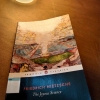The characters thinkers and characteristics in Ancient Greek Philosophy
Socrates
Socrates (469-399 BC) was known as a virtuous, honest and just person. Socrates received a lot of sympathy from the youth in his country. But he was less favored because he was accused of being a moral destroyer and rejecting gods or gods that the state had recognized.
According to Socrates, there are objective truths that do not depend on one or us. To achieve objective truth use the dialectical method which means talking or dialogue.
From his dialectical method he discovered and discovered other methods of induction and definition. He uses the term induction when thought departs from specific knowledge, then concludes it with a general understanding. A general understanding is obtained from taking the same (general) characteristics from each specific case and special features that are not mutually agreed upon are set aside. These general characteristics are called essential characteristics and all special features are called existence characteristics.
Plato
Plato (427-347 BC) was born in Athens, one of Socrates's students and friends. He uses the method of dialogue to deliver his philosophy. But according to him the general truth (definition) was not made by inductive dialogue as the way Socrates used, the general understanding (definition) according to Plato was already available there in the idea
Plato's opinion, clearly strengthens the position of his teacher. Idea is general, meaning it is generally accepted. Plato also believes that besides the general truth there is a special truth which is the "concretization" of ideas in nature.
Aristotle
Aristotle was born in 384 BC in Stagina, a city in Thirace. He is a friend and student of Plato. In the world of philosophy, Aristotle was famous as the father of logic. The logic is called traditional logic because later developed what is called modern logic. Aristotle's logic is often also called formal logic.
When many sophists assume that humans will not be able to obtain the truth, Aristotle in metaphysics states that humans can reach the truth. He stated that matter and form were united. Matter gives the substance of something, the form provides the wrapping. Each object consists of matter and form. So, he has overcome Plato's dualism which separates matter and form, for Plato matter and form to stand alone. He also believes that matter is potential and form is actuality. But there is pure substance, form without potentiality, so without matter, that is God. Aristotle believed in the existence of God. The proof of God, according to him, is God as the cause of motion
Protagoras
He said that humans are a measure of truth. The truth is private. The result is that there will be no absolute measure of ethics, metaphysics or religion. Even metaphysical theories are not considered to have absolute truth.
Thales
Thales (624-546 BC), the Miletus was dubbed the father of philosophy, because he was the one who first philosophized. The title was given because he asked a very basic question; what is the nature of the world stuff? He answered water. This answer is very simple and incomplete. Not yet finished because of what the water is? Thales takes water as the origin of the universe, perhaps because he sees it as indispensable in life and in his opinion the earth floats on water.









